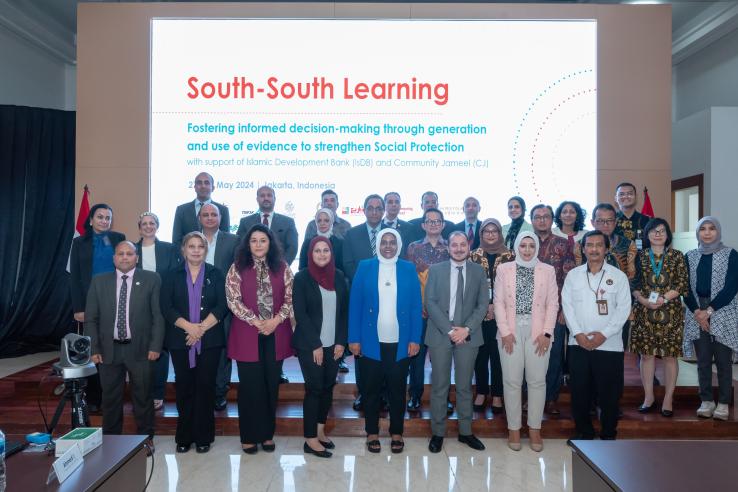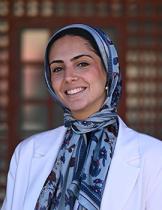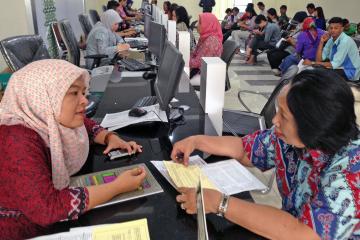Building effective social protection programs through government and researcher partnerships: Reflections from a MENA-SEA South-South Learning Journey

Social protection programs designed to tackle poverty and reduce inequality are rapidly expanding across many low- and middle-income countries. For example, in the past decade, the number of countries implementing conditional cash transfer programs has more than doubled.
In a critical moment for global social protection systems, policymakers from Egypt and Indonesia recently came together in Jakarta for the groundbreaking event, South-South Learning Journey. Organized by J-PAL Middle East and North Africa (MENA) through its government-embedded lab, the Egypt Impact Lab (EIL), in collaboration with J-PAL South East Asia (SEA), J-PAL Global, and supported by the Islamic Development Bank and Community Jameel, the five-day event aimed to improve how social protection policies are designed and executed. By sharing innovative practices and integrating evidence with policymaking, the program sought to create more effective and responsive social protection systems.
Both the governments of Egypt and Indonesia are committed to strengthening their safety nets to address the unique development challenges these regions face. The Indonesian government is working to reduce extreme poverty to 0 percent by the end of 2024, with 0.83 percent of the population in extreme poverty as of March 2024. Concurrently, the Egyptian government is set to end poverty and hunger by 2027.
In response to recent economic challenges exacerbated by the pandemic, governments are focused on designing social protection programs that are both inclusive and adaptive. The South-South Learning Journey highlighted the urgent need for evidence to shape future policies and drive informed decision-making.
This blog summarizes key learnings from Egypt and Indonesia in implementing social programs, offering valuable lessons for governments and development organizations aiming to improve social protection. It also highlights where further research is needed to enhance the effectiveness of social protection programs.
Improving data quality for effective targeting
One of the methods that the Governments of Egypt and Indonesia use to assess beneficiaries' eligibility for social protection programs is a proxy-means test (PMT), which estimates household income by collecting simple information about the assets they own. Updating information on household income used for PMTs is often challenging due to its dynamic nature. While household surveys are the typical method for updates, they are not conducted frequently due to high costs.
During the South-South Learning Journey, government leaders shared that one way to complement this is to promote using digital-based platforms, such as applications and websites, to motivate eligible people to sign up for the program. This would enable self-targeting, where people nominate themselves to be eligible for an assistance program. Rigorous evidence on self-targeting in Indonesia has shown that this encourages those most eligible to apply and discourages higher-income households.
A major challenge in targeting beneficiaries is unifying data from multiple sources while maintaining existing records. To tackle this, the Government of Indonesia is continuously updating its Regsosek’s “One Data System,” and the Government of Egypt is developing a unified database that incorporates impact evaluation insights and ensures regular updates.
Data integrity is also a challenge because program eligibility is based on survey responses. Despite employing local enumerators for more valid answers, the process is not error-free and needs improvement.
Lastly, enhancing database systems and targeting is crucial for creating adaptive social protection systems that ensure eligible people are not excluded during unexpected shocks, like the Covid-19 pandemic and natural disasters. While Indonesia continues to search for the ideal adaptive social protection model, its experience in adjusting targeting during Covid-19 offers valuable lessons for others.
The experiences shared by Egypt and Indonesia during the South-South Learning Journey provide valuable lessons for other governments and policymakers. These insights offer effective strategies to advance data management, boost program efficiency, and ensure that no eligible individuals are overlooked in times of crisis.
Using existing data to improve food subsidy programs
Learnings from Indonesia showed that when administrative data is made accessible, policymakers and researchers can evaluate social programs more effectively and strive for continuous improvement, such as in the delivery of food subsidy programs. Administrative data on household information helped researchers identify eligible and ineligible households after the implementation of the Raskin (subsidized rice program) card, showing the impact of the program on both groups.
Additionally, the collaboration between the Government of Indonesia and J-PAL affiliated researchers leveraged existing data to assess the impact of Raskin’s transition from an in-kind benefit to an electronic voucher program. This involved incorporating additional questions into the 2018 Biennial National Socioeconomic Survey. The findings revealed that the transition effectively reduced poverty and optimized delivery.
In Egypt, the longest-running social program, "Tamween," covers 87 percent of households but suffers from ineffective targeting. To address these challenges, the Egyptian government is focusing on evidence-based approaches and drawing lessons from Indonesia to enhance the program’s targeting and delivery methods, thereby improving its effectiveness in reducing poverty.
Lessons on designing cash transfer programs
The Governments of Egypt and Indonesia encountered crucial design considerations in improving conditional cash transfers, including the amount transferred, frequency of transfers, and how to enforce conditions to ensure that beneficiaries use the funds for their intended purpose.
During the learning journey, the Governments of Egypt and Indonesia highlighted the importance of weighing the implementation costs with the intended long-term impact when redesigning cash transfer programs. This exchange could pave the way to exploring alternative cash transfer methods that may achieve the same objectives at a lower cost. In Morocco, education-labeled cash transfers—where funds are earmarked for specific purposes like education or healthcare without additional conditions—resulted in higher school participation compared to groups receiving conditional cash transfers (which required children to miss no more than four days of school each month) or no transfers at all.
Improving health insurance subsidies
The Governments of Egypt and Indonesia apply contributory models of national and universal health insurance, which subsidize insurance for low-income people while encouraging higher-income individuals to finance their own coverage. Formal sector workers contribute through payroll taxes, but a key challenge is developing effective strategies to enroll and retain higher-income informal sector workers, who are not covered by the formal tax system.
Evidence from a randomized evaluation in Indonesia found that affordable pricing can affect the enrollment of informal workers in National Health Insurance. Enhancing quality services and benefits covered in the program schemes can also improve users’ trust and satisfaction, leading to improved enrollment.
During the learning journey, policymakers suggested implementing technological solutions to streamline administration and payments, as well as enhancing healthcare provider capacity. The Government of Egypt is now considering these interventions to improve its health and social insurance systems.
Key ingredients for a fruitful relationship between policymakers and researchers
Improving evidence adoption requires effective collaboration between policymakers and researchers, a task made challenging by rapid policy changes, diverse stakeholder involvement, and the critical need for relevant evidence. Facilitating learning exchanges, such as the South-South Learning Journey, serves as an effective tool for implementing these insights into social protection programs. This approach offers a swift and practical way to advance knowledge and practice.
Embedded government labs play a crucial role in overcoming these challenges. For instance, Indonesia's National Team for the Acceleration of Poverty Reduction (TNP2K) not only supports the production of evidence but also facilitates the uptake of research findings in government decision-making. TNP2K's successes highlight its role in enhancing evidence-based policy by offering recommendations to policymakers that improve the effectiveness of anti-poverty programs like Raskin and Program Keluarga Harapan.
The Government of Egypt has institutionalized the EIL as an embedded lab within the National Institute of Governance and Sustainable Development, aiming to enhance the use of evidence in improving governmental programs and policies. Similar to Indonesia's TNP2K, EIL is an essential government entity that fosters partnerships between the government and researchers, focusing on effective stakeholder communication, prioritizing needs, and integrating research into decision-making. This objective is facilitated through J-PAL's collaboration with government partners and participation in programs like South-South Learning.
Discover more policy lessons from rigorous evidence on social protection programs through J-PAL’s Policy Insights. To explore potential research collaborations with the Government of Egypt on the identified areas of interest, please reach out to Mariam Youssef, Policy Associate at J-PAL MENA.



